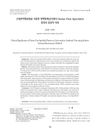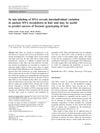 60 citations,
August 2008 in “Human molecular genetics online/Human molecular genetics”
60 citations,
August 2008 in “Human molecular genetics online/Human molecular genetics” A position effect on the TRPS1 gene causes excessive hair growth in humans and mice.
 51 citations,
January 2012 in “Annals of Dermatology”
51 citations,
January 2012 in “Annals of Dermatology” Asian hair loss differs from Europeans; consider individual needs and psychological well-being for treatment.
 50 citations,
September 2011 in “Biochimica et Biophysica Acta (BBA) - Molecular and Cell Biology of Lipids”
50 citations,
September 2011 in “Biochimica et Biophysica Acta (BBA) - Molecular and Cell Biology of Lipids” Maintaining the right amount of retinoic acid is crucial for healthy hair and skin.
 50 citations,
May 2004 in “Journal der Deutschen Dermatologischen Gesellschaft”
50 citations,
May 2004 in “Journal der Deutschen Dermatologischen Gesellschaft” Estrogens generally inhibit hair growth and improve skin quality, but their exact effects on hair follicles are complex and not fully understood.
 45 citations,
April 2018 in “Nature Reviews Urology”
45 citations,
April 2018 in “Nature Reviews Urology” Male genital development is driven by androgen signaling and understanding it could help address congenital anomalies.
 45 citations,
July 2009 in “Journal of Investigative Dermatology”
45 citations,
July 2009 in “Journal of Investigative Dermatology” The S100A4 protein is more common in psoriatic skin and could be a target for treating psoriasis.
 45 citations,
August 2005 in “Bioorganic & medicinal chemistry”
45 citations,
August 2005 in “Bioorganic & medicinal chemistry” New compounds with carborane showed anti-androgen effects similar to flutamide.
 43 citations,
August 2010 in “Expert Opinion on Investigational Drugs”
43 citations,
August 2010 in “Expert Opinion on Investigational Drugs” Inhibitors of 11β-HSD1 show potential for treating type 2 diabetes but require more testing for safety and effectiveness.
 42 citations,
July 2007 in “Journal of Biological Chemistry”
42 citations,
July 2007 in “Journal of Biological Chemistry” Most Hairless gene mutations reduce its ability to work with the Vitamin D Receptor, which might explain a certain type of hair loss.
 41 citations,
October 2008 in “The American journal of pathology”
41 citations,
October 2008 in “The American journal of pathology” Blocking a specific protein signal can make hair grow on mouse nipples.
 41 citations,
August 2007 in “British Journal of Dermatology”
41 citations,
August 2007 in “British Journal of Dermatology” Men with Kennedy disease have less chance of hair loss.
 40 citations,
November 2009 in “Experimental Dermatology”
40 citations,
November 2009 in “Experimental Dermatology” The mineralocorticoid receptor may play a role in skin and hair health and could be a new target for treating related disorders.
 39 citations,
July 2021 in “Stem Cell Research & Therapy”
39 citations,
July 2021 in “Stem Cell Research & Therapy” Using fat stem cells and blood cell-rich plasma together improves healing in diabetic wounds by affecting cell signaling.
 38 citations,
December 2009 in “Therapeutic Advances in Medical Oncology”
38 citations,
December 2009 in “Therapeutic Advances in Medical Oncology” The conclusion suggests that prostate cancer should be classified by castration status and that new therapies targeting androgen receptor signaling show promise.
 37 citations,
January 2002 in “British journal of dermatology/British journal of dermatology, Supplement”
37 citations,
January 2002 in “British journal of dermatology/British journal of dermatology, Supplement” Apple extract called procyanidin B-2 was found to greatly increase hair growth.
 36 citations,
May 2017 in “The journal of sexual medicine”
36 citations,
May 2017 in “The journal of sexual medicine” Cyproterone acetate treatment is safe and causes mild feminization, which increases with added estrogen.
 34 citations,
July 2009 in “Journal of Cell Science”
34 citations,
July 2009 in “Journal of Cell Science” ΔNp63α helps control a protein that stops cancer cells from spreading.
 32 citations,
May 2018 in “Cell Cycle”
32 citations,
May 2018 in “Cell Cycle” Melatonin helps Cashmere goats grow more hair by affecting certain genes and cell pathways.
 32 citations,
January 2017 in “Orphanet journal of rare diseases”
32 citations,
January 2017 in “Orphanet journal of rare diseases” FOXN1 gene mutations cause a rare, severe immune disease treatable with cell or tissue transplants.
 31 citations,
January 2017 in “Phytotherapy Research”
31 citations,
January 2017 in “Phytotherapy Research” Ziziphus jujuba Mills may have health benefits, but more research is needed to confirm its safety and effectiveness.
 31 citations,
April 2016 in “Nature communications”
31 citations,
April 2016 in “Nature communications” Certain signals are important for reducing specific chemical markers on hair follicle stem cells during rest periods, which is necessary for healthy hair growth.
 30 citations,
June 2014 in “Seminars in Immunology”
30 citations,
June 2014 in “Seminars in Immunology” Future research on ectodysplasin should explore its role in diseases, stem cells, and evolution, and continue developing treatments for genetic disorders like hypohidrotic ectodermal dysplasia.
 29 citations,
September 2012 in “Birth Defects Research”
29 citations,
September 2012 in “Birth Defects Research” Wounds heal without scarring in early development but later result in scars, and studying Wnt signaling could help control scarring.
 28 citations,
April 2009 in “Annals of laboratory medicine”
28 citations,
April 2009 in “Annals of laboratory medicine” The dense fine speckled pattern in ANA tests is common in autoimmune diseases, challenging previous beliefs that it was unrelated.
 27 citations,
February 2020 in “Journal of Cardiovascular Translational Research”
27 citations,
February 2020 in “Journal of Cardiovascular Translational Research” Women generally handle heart enlargement better than men, but it's riskier for them if it occurs; hormones like estrogen offer some protection.
 27 citations,
August 2018 in “Frontiers in Plant Science”
27 citations,
August 2018 in “Frontiers in Plant Science” High levels of auxin increase root hair growth by activating RSL2 and producing ROS, while high phosphate levels hinder growth by repressing RSL2.
 27 citations,
April 2017 in “British Journal of Dermatology”
27 citations,
April 2017 in “British Journal of Dermatology” Hair loss involves immune responses, inflammation, and disrupted signaling pathways.
 27 citations,
April 2011 in “International journal of legal medicine”
27 citations,
April 2011 in “International journal of legal medicine” In situ DNA labeling in hair can help predict forensic DNA analysis success.
 26 citations,
May 2021 in “International Journal of Molecular Sciences”
26 citations,
May 2021 in “International Journal of Molecular Sciences” Cheonggukjang may help prevent and manage various diseases and improve overall health, but its odor and safety concerns need addressing.
 25 citations,
June 2018 in “Journal of The American Academy of Dermatology”
25 citations,
June 2018 in “Journal of The American Academy of Dermatology” Genes linked to fibrosis are more active in people with central centrifugal cicatricial alopecia.






























